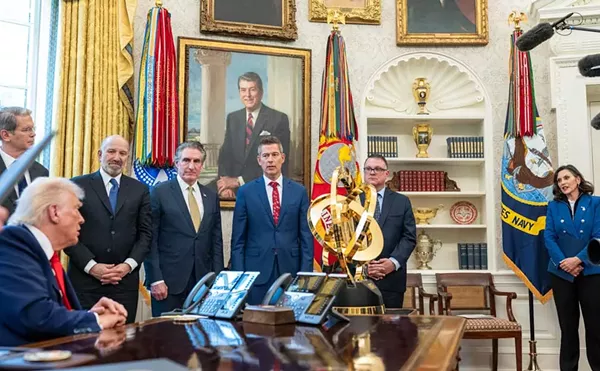
Audio By Carbonatix
[
{
"name": "GPT - Leaderboard - Inline - Content",
"component": "35519556",
"insertPoint": "5th",
"startingPoint": "3",
"requiredCountToDisplay": "3",
"maxInsertions": 100,
"adList": [
{
"adPreset": "LeaderboardInline"
}
]
}
]
You might think the Nov. 3 election to fill two seats on the Michigan Supreme Court is about which candidates will better serve the cause of justice. That's about half right.
Barely behind the scenes, the powerful Michigan Trial Lawyers Association and the state's business interests are mobilized with two radically divergent definitions of justice.
"This is a pivotal year for the future of Michigan," observes Gary Fralick of the Michigan Trial Lawyers Association. "We're seeing big corporations, insurance companies, HMO operators and tobacco companies pouring money in to elect (Republicans). If they should succeed, we're going to have a court that's more an arm of the corporations and insurance lobbies than it is a protector of the people."
As it stands now, Democrats hold a 4-3 majority on the court.
On the other side, conservatives pushing a slate of "pro-economy" candidates have found a vigorous ally in a nonprofit group called the Michigan Lawsuit Abuse Watch
On its Web site and elsewhere MLAW gives the impression that its primary focus is stopping frivolous liability lawsuits and helping groups like the Girl Scouts and Little League get out from underneath the crushing burden of the liability insurance costs that are the direct result of such suits.
Robert Dorigo Jones, head of MLAW, says that because there is the fear trial lawyers will harass these groups, MLAW won't disclose who funds the organization. He points out, however, that MLAW's bylaws prohibit it from taking contributions from tobacco companies. (The Trial Lawyers, by comparison, maintain a member-funded political action committee. Their self-interest is self-evident.)
The secrecy regarding funding causes even further skepticism when you look at the bigger picture: Although MLAW says there is no connection, it bears a startling resemblance to other statewide organizations around the country. They are known to have been established by a Washington, D.C.-based public relations firm that wants to hide that these groups were established to help change public opinion in a way that favors big corporations.
There is a clear indication of what issues matter most to MLAW in the cases it used to evaluate judicial performance. The sole basis for these ratings is whether decisions have what is vaguely described by MLAW as "pro-economy" consequences. Look at the actual cases being examined, and it becomes apparent that what is meant is whether a decision is good for corporate Michigan. A judge is an ace in the eyes of MLAW if they come down on the side of insurance companies instead of the injured, or a business retaliating against a whistleblower exposing corporate wrongdoing, or manufacturers over consumers who may have suffered because of faulty products, or private property owners seeking compensation because they are being denied the right to destroy scarce habitat or wetlands.
In the eyes of MLAW, there is no better candidate for the Supreme Court than incumbent Justice Clifford W. Taylor. A former appellate judge appointed by Gov. John Engler to fill a Supreme Court vacancy in 1997, Taylor is running to fill the two years remaining on his seat. Taylor earned an 81 percent rating on the group's pro-economy scorecard. His opponent, Detroit Democrat Carole Youngblood, wasn't evaluated because the group didn't evaluate circuit court judges.
In the other Supreme Court race, which will be for a full eight-year term, two of the six judges running were graded by MLAW. Republican Maura Corrigan, another former Engler appointee serving as chief judge of the Michigan Court of Appeals, earned a 67 percent approval rating from MLAW. By contrast, Justice Michael Cavanagh--a Democratic incumbent on the high court--received a 38 percent rating.
Other candidates for the eight-year term, none of whom received ratings from MLAW, are Democrats Judge Susan Borman of Wayne County Circuit Court and Republican Wayne Circuit Judge Jeffrey Collins. Also on the ballot are the Reform Party's Matthew Abel of West Bloomfield, Libertarian David Raaflaub of Ann Arbor and independent Jerry Kaufman of Huntington Woods.





